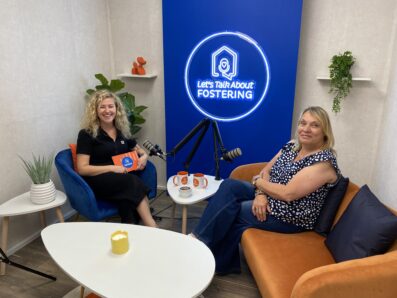Matching is a central part of fostering – it’s how we ensure children have the stability and routine they need to rebuild their lives. But what is matching, and why is it so important?
In this article, we take a closer look at the matching process and the fundamental part it plays in building happier foster homes.
What is foster care matching?
At FCA, matching is about building families. When a vulnerable child or young person needs a home, we find them the right home with foster parents who have the skills and experience to understand their specific needs. This not only sets foster families up for success but also helps children heal, grow, and thrive in their new home.
Even if a child needs a home in an emergency, matching is never a snap decision. It’s a thoughtful process that involves collaboration and attention to detail. Our referral teams work closely with foster parents and local authorities, considering each child’s physical, emotional, developmental, and educational needs to find the best fit for everyone.

Why is the fostering matching process important?
If a child or young person were to join a foster family who didn’t understand their needs, it would make it very difficult for them to heal from their previous experiences and feel secure at home. It would also affect the foster family as they try to help a child without having the necessary tools and understanding to do so.
Over time, this could lead to an unplanned ending, which means a child or young person leaves a foster parent’s care before the planned date.
Unplanned endings can be very unsettling for everyone involved. The child or young person would have to come to terms with moving homes again, and the foster parent may feel less confident in their role.
That’s why matching children with the right foster families is so important. It gives children the chance to build a good routine, form trusting connections and become part of the family and community. It also helps foster parents feel equipped to manage a child’s needs because their skills, experience and preferences will align with the child.
What’s considered during matching?
When it comes to matching, every detail matters. During your fostering assessment, we take a deeper look at all aspects of your life so that when we receive a referral, we can quickly assess whether you’d be a good match for the child.
We create a digital profile of all our foster parents, which includes:
- Your personal details.
- Your preferences, such as the age of the children you foster and if you’re open to fostering siblings.
- Your skills and experience, including training you’ve completed.
- Details about your household, such as whether you have children of your own or pets.
- Your location.
- Your languages.
- Your culture and religion.
- The type of fostering you provide.
Each referral will include information about the child, such as their specific needs, language, culture, religion, location, background, and the reasons for being in care. Our referral teams will compare all our foster parent profiles with the child’s details to find the most suitable match.
The foster care matching process step-by-step
Here are the steps we take from receiving a referral to welcoming a child into your home.
- Step 1: If local authorities can’t find a suitable match for a child through their own network of foster parents, they’ll refer the child to us.
- Step 2: Our dedicated referral teams review the information provided by the local authority about the child, comparing the details with our foster parent’s digital profiles.
- Step 3: The referral teams will contact the foster parents they think will be the best match for a child, sharing all the details about the child so they can decide whether they also believe they’d be a good match.
- Step 4: If a foster parent agrees that they’d be a good match for the child, our referral teams will send their digital profile to the local authority.
- Step 5: The local authority will compare all the foster parent profiles they receive before deciding which foster family would be the most appropriate match for the child.
- Step 6: Once the foster parents have been selected, we’ll work with the local authority and the foster parents to create a plan for the child’s care.
- Step 7: Once the match is agreed upon and confirmed, depending on the type of fostering that the foster parents provide, they’ll have the chance to meet the child before welcoming them into their home.
- Step 8: The child will join the foster family.
We’ll support you throughout the matching process and will always be transparent about the needs of each child. Don’t be afraid to ask questions or raise your concerns – we want all our foster parents to feel comfortable with their decision to foster a child.
Unplanned endings
At FCA, our approach to the matching process, training and support means we have a low rate of unplanned endings.
However, even though we make every effort to find the right match between child and family, sometimes things don’t work out as planned. All we ask is that you’re always open and honest about how you feel things are going with your foster child. This way, we can provide support tailored to you before things break down.
When challenges arise, we’re here for you.
Many children in care are living with trauma, which means sometimes certain behaviours and needs aren’t fully understood until they’re in a safe, stable, and loving home. But when challenges arise, you have a community to help you manage them. We are dedicated to providing therapeutic foster care that nurtures the whole family, and our Team parenting model helps us achieve this.
Team parenting means you don’t foster alone. You have access to a higher level of support, including:
- Social worker supervision: You’ll have your own dedicated supervising social worker who’ll always be there to answer your questions and support you through challenges. They can also help you identify any further training and support you may need.
- 24/7 helpline: As a foster parent, you never clock out, and neither do we. You can contact our fostering teams at any time, every day.
- Expert intervention: We have a network of fostering experts who can help meet the needs of children in your care, including social workers, education leads, and therapists.
- Therapeutic training: We provide ongoing therapeutic training that helps you understand how trauma impacts a child’s relationships, behaviour, and overall development. If your foster child needs help in a particular area, we offer a wide range of specialist training topics, such as Understanding Autism, Mental Health Awareness, and Bullying.
- Support groups: We have a friendly community of foster parents who you’ll meet with regularly to share your experiences, lean on each other, and build lifelong friendships. We also host support groups for foster children and children of foster parents, so your whole family will have a safe space to share their thoughts and feelings.
- Participation: We organise activities and events to bring foster families together. One of our most loved events is the Big Sing Off, where our regions form choirs and compete to be named champions. These events help you connect with foster parents further afield and support children in building their confidence and self-esteem.
At FCA, our goal is to change the lives of vulnerable children and young people by matching them with foster parents who understand their unique needs. From here, they have a chance to work towards a future that truly reflects their values, hopes and dreams.
If you’d like to learn more about the matching process, call us on 0800 023 4561 or submit our online enquiry form, and a member of our friendly team will contact you.
Read More…





